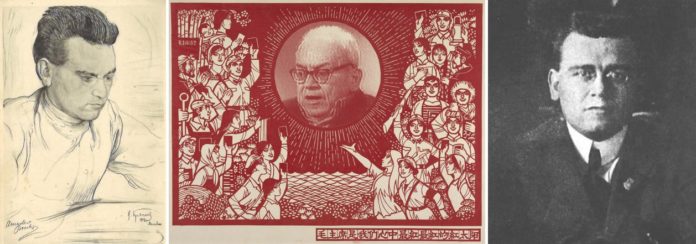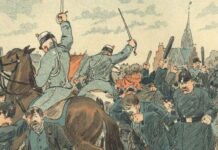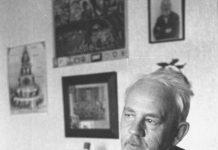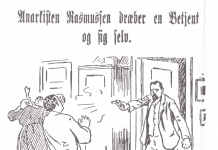Socialistisk Biblioteks Tidslinje med links til begivenheder og personer i 1889.
Se også Index over personer, organisationer/partier og værker (som bøger, malerier, mm.), steder, begivenheder, mv., der er omtalt på hele Tidslinjen, titler og indhold på emnelisterne osv.
Bladliste
Nye blade 1889:
- Arbejderbladet. Rønne
- Arbejderen
- Programmet
Se:
[sta_anchor id=”18890416″ /]
16. april 1889
Charles Spencer (Charlie) Chaplin fødes i London. (Dør 25. december 1977 i Svejts).
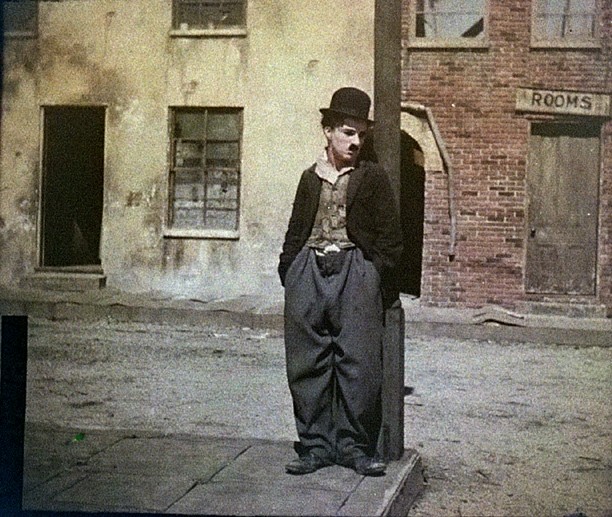
Leksikale:
- Chaplin, Charles Spencer (Leksikon.org)
- Charles Chaplin (Denstoredanske.dk)
- Charlie Chaplin (Spartacus Educational)
- Charles Chaplin (Internet Movie Database)
- Charlie Chaplin (Wikipedia.dk) + længere på engelsk (Wikipedia.org)
- FBI Records: The Vault: Charlie Chaplin (The FBI)
Artikler:
The Real Charlie Chaplin: New documentary about the immortal comic actor, director. By Joanne Laurier (World Socialist Web Site, 6 January 2022). “There is no reason to disagree with the assessment made by critic Andrew Sarris some 40 years ago that ‘Charles Chaplin is arguably the single most important artist produced by the cinema’.”
The #MeToo movement and the case against Charlie Chaplin: How and why the American establishment constructs sex scandals. By David Walsh (World Socialist Web Site, 7 June 2018). “… Hoover and the FBI concocted a combined sexual and political smear campaign that resulted in damaging Chaplin’s film career …”
The FBI vs. Comrade Charlie Chaplin. By Vijay Prashad (CounterPunch, July 28, 2017). “It was Chaplin’s popularity and his message that disturbed the FBI.”
Playing the underdog. By Niall Mulholland (Socialism Today, Issue 191, September 2015). Review of Peter Ackroyd, Charlie Chaplin (Vintage, 2015, 272 p.): “Although Peter Ackroyd’s compact biography cannot plumb the depths of his subject, it is an unsparing, perceptive account of the brilliant artistry and life of Chaplin …”
Je Suis Charlie Chaplin (RS21: Revolutionary Socialism in the 21th Century, February 7, 2015). “Colin Revolting looks at the politics of Charlie Chaplin.”
Charlie Chaplin’s The Gold Rush comes to Lexington, Kentucky. By Hiram Lee (World Socialist Web Site, 24 March 2014). “The film showing and musical performance met with a large and appreciative audience.”
Never afraid to stand up (SocialistWorker.og, April 16, 2009). “Scott Johnson celebrates the life of ‘The Little Tramp’, Charlie Chaplin, on the anniversary of his birth 120 years ago.”
Charlie Chaplin: a tramp for our troubled times (Socialist Worker, Issue 2141, 3 March 2009). Review of Simon Louvish, Chaplin: The Tramp’s Odyssey (Faber and Faber, 2009, 432 p.): “Nat Mankelow looks at a new biography of the rebellious film star.”
Where puddings come true (Green Left Weekly, Issue 90, March 3, 1993). David Sampson reviews Richard Attenborough’s film Chaplin: “And it is not only the political and social context of Chaplin’s life and work that are neglected. Sadly, and in this case it is due to incompetence rather than distortion, Chaplin’s genius is not conveyed.”
Chaplin: ‘A lyric clown with a conscience’. By Phil Shannon (Green Left Weekly, Issue 491, 5 May 2002). Review of David Robinson, Chaplin: His Life and Art (Penguin, 2001, 892 p.): “The Chaplin of David Robinson’s colourful, if pedantic, biography emerges as a lyric clown with a conscience who made political rulers edgy and fearful.”
Se også på Socialistisk Bibliotek:
- Tidslinjen 5. februar 1936 om filmen Moderne Tider.
- Tidslinjen 15. oktober 1940 om filmen Diktatoren.
[sta_anchor id=”18890613″]
13. juni 1889
Den italienske venstrekommunist Amadeo Bordiga fødes i Resina, Napoli-provinsen. (Dør i Formia, Latina-provinsen, 23. juli 1970). Medstifter af det italienske kommunistparti (PCI) i 1921 og dets første formand (-1924).
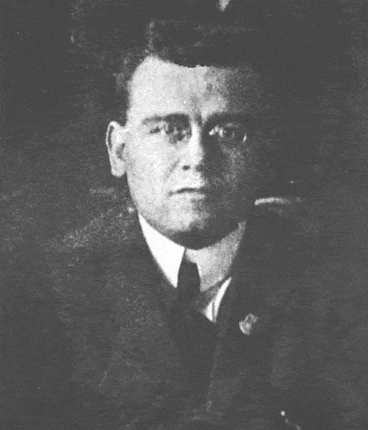
På dansk:
Bordiga, Amadeo (Leksikon.org)
Amadeo Bordiga: En lille introduktion i anledning af en bibliografi (pdf). Af Carsten Juhl (Arbejderhistorie, nr.3, 1997, s.10-19). “Artiklen præsenterer den italienske marxist Amedeo Bordiga (1889-1970). Det sker i anledning af udgivelsen af den første bibliografi over den kommunistiske tænkers og partileders skrifter og breve.” Med en liste over tekster af Amadeo Bordiga oversat til dansk eller svensk, bragt i Kommunismen / Kommunistisk Program, 1969-1972 (side 18-19).
Leksikale/sites:
- Amadeo Bordiga (Wikipedia.org). Med links til kortere norsk artikel
- Amadeo Bordiga Archive (Marxists Internet Archive). Tekster af Bordiga.
- Amadeo Bordiga (Marxists Internet Archive; Svensk avdelning)
- Amadeo Bordiga (Libcom.org). Tekster af/om Bordiga.
- Writings of Amadeo Bordiga on this server (Italian, French, German, English, Spanish, Russian) (International Library of the Communist Left)
Articles in English:
Why Bordiga got democracy wrong (Cosmonaut, January 6, 2022). “Daniel Melo takes issue with Amadeo Bordiga’s rejection of democracy.”
The conflict between Gramsci and Bordiga in the early days of the Italian Communist Party, and the Lyon Theses. By Roberto Sarti (In Defence of Marxism, “This article explains the disagreements and political errors that marred the early years of the Communist Party of Italy (PCd’I). The Lyon Congress of 1926 was a culmination of the contradictory nature of the PCd’I …”
Wrongly overlooked thinker (Weekly Worker, Issue 1309, 23 July 2020). David Broder reviews Pietro Basso’s The science and passion of communism: selected writings of Amadeo Bordiga (1912-1965) (Historical Materialism Book Series, 2020, 516 p.). “Fifty years since his death on July 23 1970, some of Amadeo Bordiga’s most important texts are finally available in English.” See also David Broder’s interview with Pietro Basso: Amadeo Bordiga was the last communist to challenge Stalin to his face (Jacobin, August 13, 2020).
Amadeo Bordiga and the development of a revolutionary core. By Doug Enaa Greene (Links: International Journal of Socialist Renewal, April 2016). “Bordiga remained frozen and faithful to a heroic moment that passed, which was both his strength and weakness.”
Bordiga and the fate of Bordigism (Weekly Worker, Issue 991, December 19, 2013). “Though he is largely remembered in the context of Lenin’s polemic against left-wing communism, Amadeo Bordiga remains a towering figure of the 20th century workers movement. David Broder explores his ideas and political record.”
Amadeo Bordiga, the agrarian question, and the international revolutionary movement (Critique, No.23, 1991, p.73-100; online at Libcom.org). “Loren Goldner’s introduction to Amadeo Bordiga’s critique of Soviet Industrialization and capitalism, and how it differs from his contemporaries such as Trotskyism.”
Bordigism (1975) (Libcom.org). “Article by Adam Buick looking at the later writings of Amadeo Bordiga on the content of communism.”
Bordiga and the idea of Socialism (Socialist Standard, Issue 930, February 1982). “… his experience of the failure of the PSI to control its MPs had made him an ‘abstentionist’, or opponent of contesting elections and participating in parliament.”
Amadeo Bordiga: beyond the myth and the rhetoric. By Onorato Damen (Internationalist Communist Tendency, 1970; online at Marxists Internet Archive). “… we aim to show what can be accepted and defended because of its contribution to revolutionary theory, and what we don’t consider to be in historic continuity with the international communist left …”
Se også/See also:
- Letter to the Italian Left Communists (To the adherents of Comrade Bordiga) (1929). By Leon Trotsky (Fourth International, Vol.8, No.6, June 1947)
- Left-Wing, Anti-Bolshevik and Council Communism (Marxists Internet Archive). Index to the works of ‘Left Communists’ [‘Council Communists’/’Anti-Bolshevik Communists’].
- International Library of the Communist Left (Sinistra.net)
Se også på Socialistisk Bibliotek:
- Personlisten: Antonio Gramsci (1891-1937)
- Tidslinjen: 19. oktober 1922, om Benito Mussolini.
- Tidslinjen: 1. september 1920, om de italienske fabriksbesættelser.
[sta_anchor id=”18890714″ /]
14. juli 1889
Anden Internationale stiftes i Paris, en sammenslutning mellem socialdemokratiske partier, i perioden hvor de bliver massepartier.
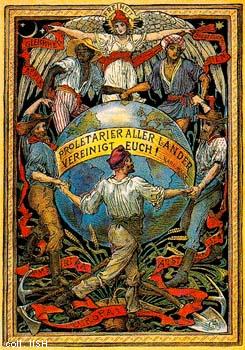
Se:
- Anden Internationale. Af Jon Elster (Leksikon.org)
- Second Intenational (Wikipedia.org)
- The Second International (Social-Democracy), 1880-1917 (Marxists Internet Archive; History Archive)
Sources on the development of the Socialist International (1907-1919) (Friedrich Ebert Stiftung). In English, Deutsch and French. Introduction, Veinna Congress 1914, Women 1907-1915, Youth 1907-1919 by Gerd Callesen.
Socialist Internationals: A Bibliography. Publications of the Social-Democratic and Socialist Internationals 1914-2000 (pdf). Compiled by Gerd Callesen (International Association of Labour History Institutions, IALHI, 2001, 166 p.). Introduction (p.7-16).
July 1889 (Paris): Two International Congress took place in Paris in 1889 on the same date (14 July) because of an internal struggle within the French movement between the “Possibilists” supported by most of the French, and the “Marxists”, supported by most of the Germans socialists and Engels, though he did not attend … May Day was declared as an international working-class holiday. Citat fra omtalen på Marxists Internet Archive.
Proceedings of the International Working-men’s Congress in Paris (1889)
Editor: Wilhelm Liebknecht (Marxists Internet Archive)
Incl. pkt. 10:
Denmark (2): Christensen
The Female Labour question: Zetkin
Arbejdere i alle lande. Af Gerd Callesen (Arbejderen.dk, 26. august 2010). “Anden Internationales kongres i 1900 besluttede at styrke organisationen. Men det varede endnu fire år, før Internationalen kan anses for en organisation, der koordinerede medlemmernes aktiviteter.”
Did the Left wing of the Second International foreshadow the politics of the Third? By John Marot (Tempest, August 25, 2023). Review of Mike Taber (ed.), Reform, Revolution, and Opportunism: Debates in the Second International, 1900–1910 (Haymarket Books, 2023, 272 p.). “John Marot argues that the politics of the Third International, formed in 1919, did not just carry forward the positions of the Left wing of the Second. The Russian Revolution of 1917 changed what the Left thought about workers’ power.”
See also review by Gus Woody: Learning from the Second International (RS21, 4 October 2023) + review by Chris Bambery (Counterfire, 5 October 2023) + review by Paul Hampton: Big socialist debates before 1914 (Solidarity & Workers Liberty, Issue 696, 17 January 2024) + review by William Smaldone: Socialism past, Socialism present (Against the Current, Issue 229, March-April 2024).
The Second International’s conflicted legacy. By Mike Taber (MR Online, June 28, 2022). “The best of this legacy, however, legitimately belongs to revolutionary socialists. Understanding the Second International’s strengths, weaknesses, and contradictions can be of major benefit for the movement today.”
Debates in the Second International. By Mike Taber (John Riddell: Marxist Essays and Commentaries, April 3, 2022). “The following is an edited version of a talk given at the Online Communist Forum, based in London UK, on 27 March 2022. In it Mike Taber discusses a new book he is preparing, to be published by Haymarket Books.”
Reclaim our legacy (Weekly Worker, Issue 1311, August 6, 2020). “Mike Taber discusses the Second International and the new book, he has edited.” (Under the Socialist Banner: Resolutions of the Second International, 1889-1912, Haymarket Books, 2021, 272 p.).
See also:
New book on Second International’s Marxist years: Comments by Socialist historians (Marxist Essays and Commentary, July 5, 2021).
Review by Chris Bambery (Counterfire, December 28, 2021).
Review by Daniel Gaido (Marx & Philosophy Review of Books, 26 January 2022).
Storming the World’s Bastilles (Jacobin, 14 July 2019). Interview with Jean-Numa Grange: “On Bastille Day 1889, militants from around the world met in Paris to declare an international union of socialist parties. The Second International promised to spread the spirit of the revolution across borders, only itself to fall victim to nationalist passions.”
The rise and fall of the Second International. By Sean Larson (Jacobin, 16 July 2017). “On July 14, 1889, the Second International was born to unite the workers of the world. What happened to that dream?”
Second International: Imagination, inspiration and betrayal. By Ben Lewis (Weekly Worker, Issue 961, May 9, 2013). Review of Kevin Callahan, Demonstration culture: European socialism and the Second International, 1889-1914 (Troubador Publishing, 2010, 324 p.). “What is remarkable about this book is its detailed description of the vast array of means and methods that were deployed in order to get this message across …”
The Second International: From class war to imperialist slaughter (Socialist Worker, Issue 2188, 13 February 2010). “Dan Swain looks at the rise and fall of the Second International.”
History of the Marxist internationals. Part 2: The Second International. By Louis Proyect (The Unrepentant Marxist, February 15, 2010).
Se også:
Programme: Lessons of Erfurt. By Mike Macnair (Weekly Worker, Issue 976, September 5, 2013).
Revisionism revisited: The reform vs. revolution debate in Second International Marxism (The Charnel-House, February 19, 2016).
Aspects of Internationalism at the turn of the 19th/20th century (pdf). By Gerd Callesen (Arbetarrörelsens Arkiv och Bibliotek, 2002, 13 p.).
Se også på Socialistisk Bibliotek:
Tidslinjen 16. oktober 1854 om Karl Kautsky.
[sta_anchor id=”18890814″ /]
14. august 1889
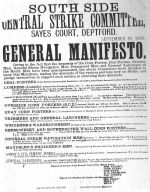
Den store havnearbejderstrejke i London starter, bliver et vendepunkt i den faglige organisering i engelske arbejderbevægelse, især af ufaglærte, “New Unionism”.
- Havnearbeiderstreiken i London i 1889 (Wikipedia.no). Kortere norsk artikel.
- London Dock Strike of 1889 (Wikipedia.org)
- The rise and fall of New Unionism. By Julie Waterson (Socialist Worker, Issue 2174, 24 October 2009)
- 1889: how the British workers arose from 40 years’ depression. By Friedrich Engels (Workers’ Liberty, Issue 22, June 1995). Extract from his Preface to the second German edition of Condition of the Working Class in England (1892)
[sta_anchor id=”18891003″ /]
3. oktober 1889
Den radikale tyske pacifist og skribent Carl von Ossietsky fødes i Hamborg (Dør i Berlin, 4. maj 1938). Modtager Nobels Fredspris for 1935, 23. november 1936, se denne.
[sta_anchor id=”18891120″ /]
20. november 1889
Syv medlemmer af Socialdemokratiet ekskluderes efter en urafstemning, bl.a. Nicolai L. Petersen, Gerson Trier, Ferdinand Møller, Signe Andersen og F.J. Nielsen-Kolding.
Se:
Oppositionen i arbejderbevægelsen (Arbejdermuseet; Viden og samlinger)
Litteratur:
- Ferdinand Møller og Gerson Trier: Socialdemokratiets krise i 1889. Af Helge Scheuer Nielsen (Eget forlag, 2007, 40 sider, pjece)
- “De revolutionære”. Af F.J. Nielsen-Kolding. I: Carl Heinrich Petersen: Dansk Revolutionære (Borgen, 1970, side 34-56). Pjece om eksklusionen 1890; online på Leksikon.org.
Se også:
- Signe Andersen (Dansk Kvindebiografisk Leksikon)
- Nielsen-Kolding, F.J. (Leksikon.org)
- Møller, Ferdinand (Leksikon.org)
Se også på Socialistisk Bibliotek:
- Tidslinjen: 29. september 1916, om Natkongressen.
- Tidslinjen: 18. november 1854, om Nicolaj Petersen.
- Tidslinjen: 23. april 1851, om Gerson Trier.
- Arbejderhistorisk Bladliste 1881-1890, om Arbejderen: Socialistisk Ugeblad
















